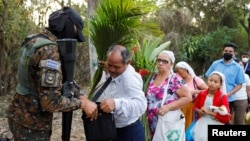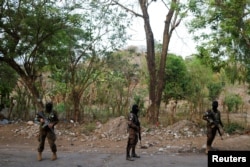The U.N. Human Rights Office says recent measures taken by El Salvador's government to rein in gang violence violate international human rights law.
U.N. officials acknowledge the threat gang violence poses to Salvadoran society and the need to tackle it. But they say a series of measures recently taken by the government in response to the rise in gang killings is not in line with international human rights law.
The U.N. Human Rights Office is critical of the harsh crackdown on gangs by the government since it declared a state of emergency on March 27. It reports police and military forces have used excessive force against gang members. It notes that more than 5,700 people have been detained without an arrest warrant, and some reportedly have been subjected to cruel and inhumane treatment.
Human rights spokeswoman Liz Throssell said certain amendments to criminal law and procedure appear to breach international law and weaken due process guarantees.
"Criminal trials can now be held in absentia, in the case of alleged gang members, or presided over by so-called 'faceless' judges, that is, judges whose identity remains confidential," she said. "The previous two-year limit to pre-trial detention has been eliminated. Teenagers associated with gangs who are found guilty of serious offenses may now be sentenced as adults."
What is particularly troubling, she said, is children will have to serve their sentences in adult, rather than juvenile, detention. And under the new law, the period juveniles will have to spend in prison has been extended.
"Those aged 12 to 16 must now serve 10-year terms of imprisonment instead of seven years. And those aged 16 to 18 years must serve 20-year terms," Throssell said. "Now we recognize the challenges posed by gang violence in El Salvador and the state's duty to ensure security and justice. However, it is imperative that this is done in compliance with international human rights law."
News reports also say Salvadoran President Nayib Bukele has threatened to cut off food to imprisoned gang members if gangs "unleash a wave of crimes." He earlier ordered that food for them be cut to two meals per day. The president has also ordered construction of a maximum-security prison to house 20,000 gang members.
Throssell said her office is seeking information from Salvadoran authorities as to what they have done to comply with their human rights obligations during the state of emergency. She added that certain rights continue to apply, even during this critical period.





